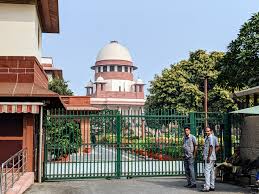This group of appeals concerns the liability to pay tax under the Assam General Sales Tax Act, 1993 (for short, ‘the Sales Tax Act’) and the Assam Value Added Tax Act, 2003 (for short, ‘the VAT Act’), respectively. In some cases, in this group of appeals, the assessees have, under a contract, agreed to provide different categories of motor vehicles, such as trucks, trailers, tankers, buses, scrapping winch chassis, and cranes, to the Oil and Natural Gas Corporation Limited (for short, ‘ONGC’). There are other cases where Indian Oil Corporation Limited (for short, ‘IOCL’) has entered into agreements with transporters to provide tank trucks to deliver its petroleum products. (Para 1)
These cases have been clubbed together as similar questions of law and fact arise. Broadly, the question is whether, by hiring these motor vehicles/cranes, there is a transfer of the right to use any goods. If there is a transfer of the right to use the goods, it will amount to a sale in terms of Clause 29A(d) of Article 366 of the Constitution of India. In short, if the transactions do not fall in the definition of ‘Sale’ in Clause 29A(d), the same may not attract tax under the Sales Tax Act or the VAT Act. As a result, there will be other questions about whether the transactions will amount to service, thereby attracting liability to pay service tax. (Para 2)
Essentially, the transfer of the right to use will involve not only possession, which may be granted at some stage (after execution of the contract), but also the control of the goods by the user. When the substantial control remains with the contractor and is not handed over to the user, there is no transfer of the right to use the vehicles, cranes, tankers, etc. Whenever there is no such control on the goods vested in the person to whom the supply is made, the transaction will be of rendering service within the meaning of Section 65(105) (zzzzj) of the Finance Act after the said provision came into force. (Para 42)
Accordingly, we allow all the appeals of the assessees by holding that the contracts are not covered by the relevant provisions of the Sales Tax Act and of the VAT Act, as the contracts do not provide for the transfer of the right to use the goods made available to the person who is allowed to use the same. Civil Appeal no.3580 of 2017 preferred by the Union of India is disposed of in view of the earlier findings with the liberty to the Union of India to initiate proceedings, if any, for recovery of service tax in accordance with law. (Para 44)
SUPREME COURT OF INDIA
2024 STPL(Web) 25 SC
[2024 INSC 27]
M/S. K.P. Mozika Vs. Oil And Natural Gas Corporation Ltd. & Ors
Civil Appeal No.3548 OF 2017 with Civil Appeal No.4658 of 2013 Civil Appeal No.4657 of 2013 Civil Appeal No.383 of 2013 Civil Appeal No.3580 of 2017 Civil Appeal No.8714 of 2012 Civil Appeal No.8705 of 2012 Civil Appeal No.8710 of 2012 Civil Appeal No.9291 of 2012 Civil Appeal No.8715 of 2012 Civil Appeal No.3579 of 2017 Civil Appeal No.3578 of 2017 Civil Appeal No.4659 of 2013 Civil Appeal No.4661 of 2013 Civil Appeal No.4660 of 2013 Civil Appeal No.3573 of 2017 Civil Appeal No.3575 of 2017 Civil Appeal No.3574 of 2017 Civil Appeal No.3577 of 2017 Civil Appeal No.3576 of 2017 Civil Appeal No.4662 of 2013 Civil Appeal No.3549 of 2017 Civil Appeal No.3557 of 2017 Civil Appeal No.7954 of 2012 Civil Appeal No.8693 of 2012 Civil Appeal No.3554 of 2017 Civil Appeal No.3556 of 2017 Civil Appeal No.3553 of 2017 Civil Appeal No.3555 of 2017 Civil Appeal No.3565 of 2017 Civil Appeal No.3551 of 2017 Civil Appeal No.3552 of 2017 Civil Appeal No.3558 of 2017 Civil Appeal No.3559 of 2017 Civil Appeal Nos.35663569 of 2017 Civil Appeal No.3572 of 2017 Civil Appeal No.3561 of 2017 Civil Appeal No.3562 of 2017 Civil Appeal No.3564 of 2017 Civil Appeal No.3563 of 2017 Civil Appeal No.3570 of 2017 Civil Appeal No.3571 of 2017 Civil Appeal No.3560 of 2017 and Civil Appeal No.3550 of 2017-Decided on 09-01-2024.
https://stpllaw.in/wp-content/uploads/2024/01/2024-STPLWeb-25-SC.pdf







